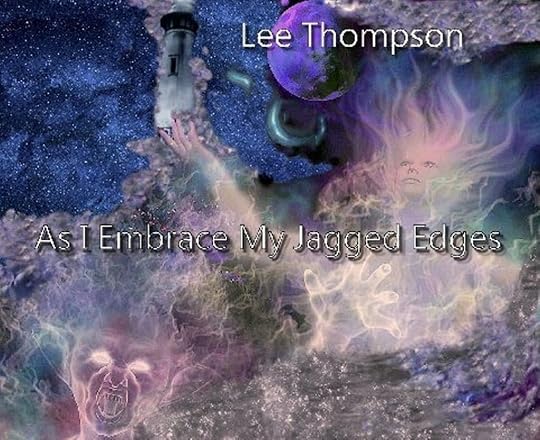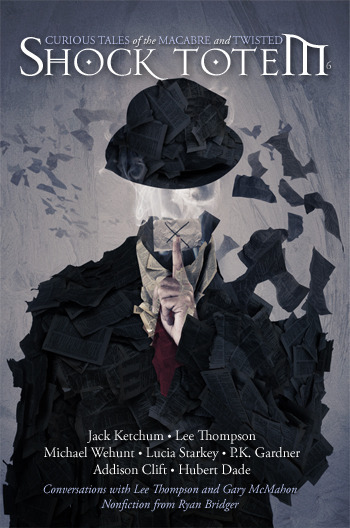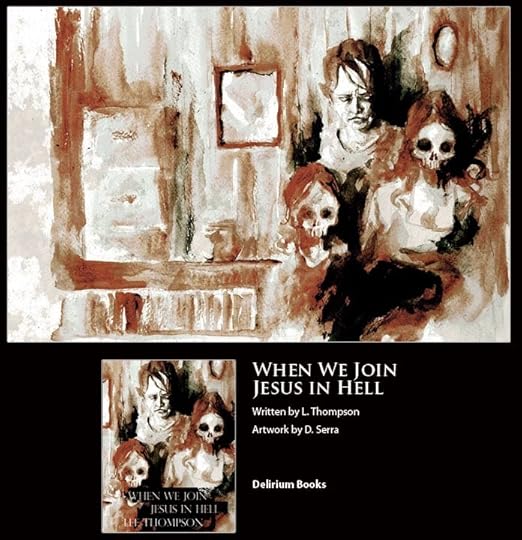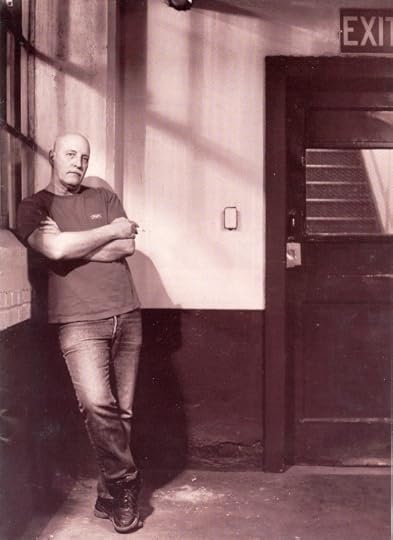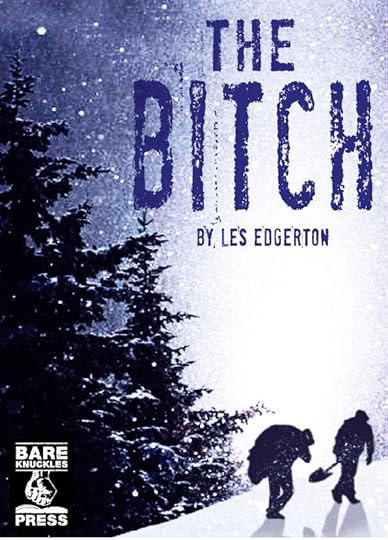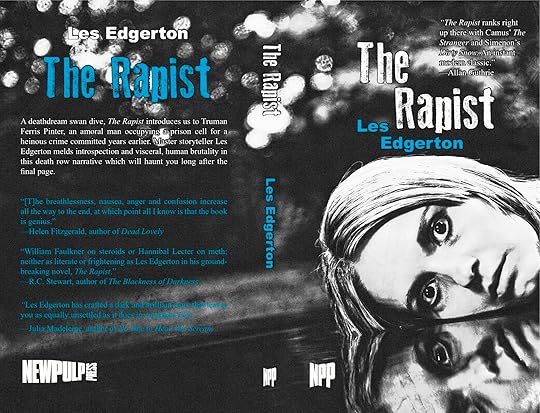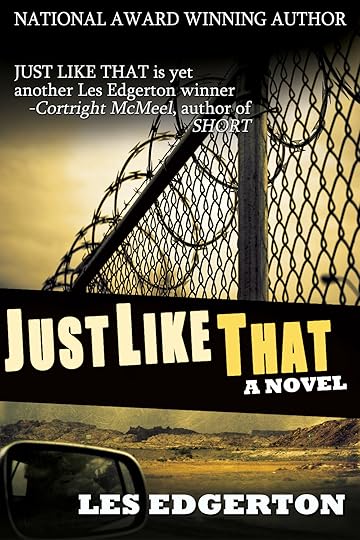Lee Thompson's Blog, page 11
January 27, 2013
Recent Book Purchases…
I went on a little book spending spree since there are a bunch I want to read over the next few months. I might not be online much. 
1. Books 3-16 of James Lee Burke’s Dave Robicheaux series
2. Shock Totem #6 (issues for the giveaway and for me and my pre-readers)
3. The Drop by Michael Connelly (Reading now)
4. The Affair by Lee Child (Read yesterday, my favorite Reacher so far)
5. Mystery; In the Night Room; and The Throat by Peter Straub
6. Gods in Alabama by Joshilyn Jackson
7. The Cold Six Thousand by James Ellroy
8. The Wrath of Angels by John Connolly
9. That Which Should Not Be by Brett Talley
10. Sharp Objects by Gillian Flynn
11. The End of Everything by Megan Abbott
12. The Cyrpress House by Michael Koryta
13. Winners copies of A Carrion Death by Michael Stanley
And I have a bunch of books lined up to buy my next go round once I finish all of these and what I have in my TBR mountain. It’s going to be an awesome year!
January 24, 2013
My Short Story Collection (Free Jan. 25-29th)
I threw together a short story collection in thanks to fans for all their support. It’ll be free through Amazon from Jan. 25-29th so make sure to download it and to spread the word! Has a bunch of my favorites and I’ll keep the price low on this even after the free promotional period. My buddy Sandy DeLuca made me a cover for it. Thanks Sandy! I’ll try to get it listed on Goodreads this weekend too.
As I Embrace My Jagged Edges (and Other Thorns) ToC:
1. We Run Races with Goblin Troopers
2. Beneath the Weeping Willow (A Division Mythos Story)
3. Daddy Screamed with Us (A Division Mythos Story)
4. Crooked Stick Figures (A Division Mythos Story)
5. When Crows Sing Sweetly Bitter Music
6. Crawl
7. A Bell Ringing in the Empty Sky
8. Sorrow’s Breast
9. The Weight of All These Years (A Division Mythos Story)
10. Boys without Faces
11. As I Embrace My Jagged Edges (A Division Mythos Story)
January 23, 2013
Shock Totem #6 Giveaway
Very excited that Shock Totem #6 will be out soon and I have just ordered 5 paperback copies to give away to some lucky buggers.
All you’ll have to do is share this giveaway on FB, or Twitter, Google +, Goodreads, or wherever, and paste the link of where you shared it in the comments section down below.
Easy. I’ll run this Giveaway for two weeks and then pick the five winners.
Very excited about sharing pages again with one of my heroes (Jack Ketchum). Plus Shock Totem is super fine and I love those guys. The interview I did for this was a blast. You can check out the table of contents here.
Thanks to anybody who spreads the word and enters!
January 22, 2013
On the Bram Stoker Award’s Preliminary Ballot
Pleased to see my novella WHEN WE JOIN JESUS IN HELL on the Bram Stoker Preliminary Ballot for Superior Achievement in the Long Fiction category.
I think the Final Ballot comes out Feb. 23rd. I don’t know if I’ll make the cut but I’m going to have a beer anyway.
I’m really happy with how this novella has been received. A big thanks to my pre-readers Shaun, Kevin, Chris, and Charlene. And to my publisher Shane Staley and his crew. And to all the wonderful readers who make “going there” worth it. I get a lot of help.
Nice to see a bunch of Delirium titles on there as well, and a few of my lady buddies *Waving at Sandy DeLuca and Mercedes Yardley!* who I hope win in their categories.
Here’s a link to the Stoker Award page: *Click Me and be great in bed*
January 17, 2013
Review in Black Static
Very happy to see the latest review of WHEN WE JOIN JESUS IN HELL in the super awesome Black Static Magazine. Thanks to Peter Tennant for the read and time! Here’s a snippet of what he said:
With its central concept of a once violent man who has been domesticated, but is prompted by circumstances to get back in touch with his inner beast, this novella reminded me of nothing so much as the Cronenberg film A History of Violence, though in the touches of arch-weirdness that litter the text – Fist trundling the corpses of his loved ones around in a shopping trolley, talking to them and pet lizard Bianca, his conversation with an artist who works with bodies – there is also more than a hint of the Lynch of Blue Velvet… At the heart of the story are questions about the nature of violence and how far we go before crossing a line. Fist’s dilemma underlines the failure of both society and the justice system, leaving a man to do what a man has got to do, if I’m allowed a cliché or two. It’s a powerful and affecting story…
You can check out Black Static here…
Also had a first recently when WHEN WE JOIN JESUS IN HELL got mentioned in another book’s review on HorrorTalk. Pretty neat. Here’s a snippet.
Not too long ago I was blown away by Lee Thompson’s When We Join Jesus in Hell. What fully impressed me was not just Thompson’s amazing skill, but the fact that I truly enjoyed a style of writing that I tend to avoid. Normally, I’m a meat a potatoes type of guy and don’t have a lot of a time for…I don’t know, “pretty” words? But Thompson didn’t care about likes, he just said read it and like it, which I did. I’m thinking J.R. Hamantaschen went to the same school as Thompson, because he pulled the same shit on me with his You Shall Never Know Security, a collection of his short stories.
Also answered interview questions for Shock Totem #6, which will be out soon with a story by me and others, including that sexy mothereffer Jack Ketchum. Looking forward to when that issue hits the stands (and ereaders).
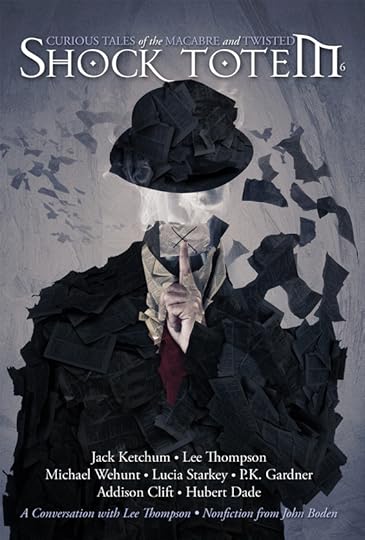
Not the Final Cover
And if you’re of a mind, swing by to participate in the discussion on Horror Aficionados where I’m guest author for January! We’re having fun and you should too!
January 11, 2013
My Vampire Novel
My buddy Sandy DeLuca’s novel MANHATTAN GRIMOIRE is free on Amazon right now. Grab it while you can! She’s incredibly talented.
And if you missed me interviewing Noir Master Les Edgerton go here to grow enlightened!
We’re also having a blast on the Goodread’s Group Horror Aficionados discussing my brutal novella WHEN WE JOIN JESUS IN HELL for the month of January. It’s a blast. Come join the party!
I hope everybody’s 2013 is off to an amazing start!
I’m working on the ending of GOSSAMER: A STORY of LOVE and TRAGEDY. I think it’s going to be the most unique story with vampires that you’ve ever read. It’s fun too because I get to tip my hat to Ray Bradbury, Clive Barker and Stephen King, all in different ways. The climax kills me. I can’t wait until I have it in shape enough to send to my readers. Probably by the end of next week.
January 8, 2013
My Agent Phone Chat…
Yes, I talked to a literary agent on the phone last night. But it wasn’t for my Lee Thompson work. It was for the Thomas Morgan, James Logan and Julian Vaughn novels. I made a post over here that you can read. Really looking forward to the next step! Thanks to Les Edgerton and Chip MacGregor as well as my readers Shaun Ryan, Kevin Wallis, Chris McCaffrey, and Charlene Cocrane!
January 5, 2013
Interview: Les Edgerton
Super pleased to have Les Edgerton on here today. I met him at Bouchercon (The World Mystery Convention) last October and we sat drinking and discussing tons of stuff I’m not going to share with you. He’s wise, witty, talented and fun. I recently read (and gave my first blurb on) his novella THE RAPIST. I can’t wait until it comes out to see how people react to it. I like edgy crime fiction with depth. Les is the real deal and I look forward to when we can hang out and have some drinks again.
He also read my novella WHEN WE JOIN JESUS IN HELL and gave me a referral to his agent Chip MacGregor, who read one of my pen-named novels (The Lesser People) over the holidays, and… I’ll be talking to Chip on the phone next week. Yay!
Feel free to share the interview and check out Les’s work! Thanks!
Q. Thanks for joining us, Les! When did you first know you wanted to be a writer?
A. When I was five and read my first book. I knew instantly that was what I wanted to do for the rest of my life. To create universes that were, if not better than the one I found myself in, at least as interesting. I knew immediately that the world of the mind had far fewer parameters and more freedom than the world I was physically in. I’ve never wavered for a second from my choice.
Q. Why do you write what you write? How much does your life experience play into your creative process?
A. I write what interests me. I create the worlds I want to inhabit. Many of those worlds are worlds I used to inhabit and miss and others are worlds I wish I was in so I invent them and get to live in them. Most of all, I want to create truth on the page. Not a convenient truth, but the truth that we all try to hide from, that is hidden deep within us without the societal camouflage we’ve all learned to put on. Anything that is persecuted by PC idiots is what I want to write about. My life experiences accounts for almost 100% of what I write about. I can only write about the people I know, experientially.
Q. Great stuff! Who are your biggest influences?
A. In terms of other writers there are a great many that have had some influence and a handful that have had a more profound impact upon me. I include people like Albert Camus, Harry Crews, Ray Carver, Celine, Flannery O’Connor, and Charles Bukowski in the latter group. In terms of thinkers, Marshall McLuhan and Jung are the ones who made me stretch my own imagination the most in terms of psychology and philosophy. In terms of personal influences in the world of letters, Cort McMeel has made a significant difference in my writing life and choices—he has the clearest mind for what’s good in literature than anyone I’ve ever known. Jon Bassoff, Brian Lindenmuth and Allan Guthrie have provided models of what I consider excellence in literature by their choices in authors they publish.
But, by far the biggest influence on my writing life was a hulking mouth-breather I only remember as “Waldo” in the fourth grade in Freeport, Texas, who used to viciously bully my skinny scared butt in front of other kids, at one point pulling a pocket knife on me and holding me down and putting it to my neck. I responded to this misery in two ways. First, I began writing little humorous vignettes about Waldo (he may not have found them humorous…) and passing them around to my schoolmates, and that had two major effects on my life. Waldo quit bullying me because of the resultant public derision and I found out the truly awesome power of the written word and firmly became a writer.
Second, I kicked his ass.
So, wherever Waldo is today (prison, I hope, or in a leprosy ward) I say, “Thanks, creep.” I think he learned that old nursery rhyme about sticks and stones just isn’t true. Words can hurt you.
They can also help.
So can a good right uppercut and a jab to the throat.
Just ask Waldo.
Q. What novel or novella of yours would you recommend to a newcomer? Why?
A. That’s a tough question. It would depend on the person. I know I should list the name of a current book that’s out there—part of this deal is to create sales, right—and I think my last two books in particular—THE BITCH and THE RAPIST—are the best I’ve ever written, but the book I usually recommend is my first collection of stories, MONDAY’S MEAL, published by the University of North Texas Press. I think it best shows my range. It also includes a story I wrote in the eighth grade as well as stories written before prison and after. It got a great review from the NY Times, comparing me to Ray Carver, and that’s my proudest moment. I reread it often and in my mind it stands the test of time well.
Q. I can’t wait to check out Monday’s Meal. I can see how the NY Times review comparing you to Raymond Carver would be something to savor, and revisit, from time to time. What are you working on now?
A. Uh… this interview? Oh, you mean book-wise. My bad. A few things. I usually keep several balls in the air at once. Among those projects are a follow-up novel to my unpublished black comedy crime thriller, THE GENUINE, IMITATION, PLASTIC KIDNAPPING, a new novel along the lines of THE BITCH, a new writer’s craft book using film to inform fiction techniques, rewriting my memoir, ADRENALINE JUNKIE… just a lot of different stuff. I’m also working at the moment on a bottle of the best whiskey I’ve ever drunk, Midleton Very Rare Irish Whiskey, which was sent to me by my writer friend Gerald O’Connor from London, who wanted to show me why I should quit drinking Jack Daniels. Gerald, I can’t quit J.D. (price, mate!), but at least I know what great whiskey tastes like now.
Q. What do you wish you knew now that you’ve had to learn through experience?
A. This could take more than a ream of paper… First, to never date a girl named after a day of the week or play poker with a dude named after a city. (And to totally avoid a girl who ends her name with an “i” and dots it with a heart…) Second, I would have moved to New York City in my twenties and found out where editors drink and begun hanging out there. Too late, I discovered the value of networking for a writer’s financial success. I know I’ve had a measure of success living in The Great Flyover and so have lots and lots of others, but it would have hastened everything if I’d just known the value of meeting and becoming friends with gatekeepers. The main thing I learned later in life than I would have liked to though, is that you can write anything and if it’s good it can become published. Because of the many censors in my life—from librarians and schoolteachers to parents to the reviewers’ choices at mainstream publications—I had no idea I could write the things guys like Bukowski and Everson and Selby wrote… because I hadn’t ever read their books or been aware of them. I wish I’d had teachers and librarians in my life who are like me as a parent—I’ve just never practiced much (read: not any) censorship with my kids and I’m very proud that I’ve respected their intelligence. One of the best things I’ve ever had said to me was by my son Mike, who turned to me one day when he was about six or seven, and said, with a dead-serious look on his kisser, “Dad, I like to go to your readings ‘cause I get to hear the word ‘fuck’ legally.” I imagine the PC twits would recoil in horror at that, but for me it was a truly proud moment.
I wish I’d known that all I had to do to avoid prison was to get a good lawyer.
Q. Great stuff. It seemed to me there were drastically different voices in THE BITCH and THE RAPIST. I really liked the differences. That’s not really a question but feel free to talk about them.
A. I hope there are different voices! These are two very different people. Jake, in THE BITCH is an ex-con doing his best to get his life in order. He’s above-average in intelligence and has just figured out that crime doesn’t pay—at least it doesn’t pay enough to warrant the risks involved. But, in most ways, he’s Everyman. Truman, in THE RAPIST, on the other hand, is a far different creature. He’s extremely well-read, albeit without a rigid canon in his education which is possessed of both an Ivy League outlook as well as borrowing part of his education from archaic notions even for Princeton, and adheres to a classical view of the universe; “classical” in the 18th century view as opposed to the 20th or 21st century definition. While Jake is very bright with an I.Q. probably in the 130+ range and is street-smart, Truman is in the true genius range with a measured I.Q. of at least 165, but from a very cloistered background. He’s in the wrong century whereas Jake is perfectly contemporary. Jake’s bought into the American Dream, whereas Truman abhors the idea of living a life for cars, clothes, houses, and a platinum card. He views money and wealth as security and not as an ends unto itself.
I presume the question behind your question is how can a writer write with different voices. The answer was furnished by Walt Whitman, who said we “all contain multitudes.” And we do. Some more than others.
We all have many voices within us that are very “natural” to us. For instance, I can (and have) attended a governor’s inauguration ball and met the guv and other dignitaries and talked to them in one way. A way that was very natural to me. I’ve also been in more than one biker bar and met other bikers and talked to them in a very different way. A way that was just as natural to me. We all do that in real life. It shouldn’t be that difficult to do in fiction, right? Writing a character is like playing an acting role. Actors play different characters all the time, so why shouldn’t writers?
Commercially, of course, it’s best to stick with one voice as a writer. Witness someone like John Grisham or any number of best-selling writers. Most employ the same voice in all of their work and that leads to a large audience who enjoy that voice and simply want to keep reading the same thing, over and over. Usually with the same plot over and over as well, just with slightly different characters with different names plugged in. If they encounter a book by such a writer that isn’t close to the previous one, in all likelihood they’re going to be pissed and will move on to… James Patterson or (plug in the name of any writer who is consistently on the best-seller lists).
Personally, if my aim was to become a bestselling author or create a huge platform (I hate that word and that concept—just another example of group-speak, New-Agey language that’s deteriorating the language and intelligent thought), then I would be well-advised to stick to one voice in each book. But, if I did that, I might as well sell life-insurance. It would become all about the money and nothing about the art. I’d become Miles Davis practicing the scales all day long. Miles wouldn’t do that and I wouldn’t either. I’d become Sha-Na-Na. Good money in that, but money’s not my god.
Q. Agreed. Writing the same book over and over would bore the hell out of me. What’s your typical writing day like?
A. I get up at around 4:30-5:00, take a pill, go back to sleep for an hour (I have to because of the pill), get up, grab coffee and sit on the shitter, drink coffee, read the newspapers, take other pills. Then, I go into my writing room, turn on the ‘puter and begin to write. I’ll stay at my desk all day and write. I don’t eat breakfast or lunch (it wastes time I’d rather spend writing). I take bathroom breaks where I read novels in 15-minute bursts. I smoke all day long and drink one cup of coffee after another. Around two in the afternoon, I’ll draw a hot, hot bath and soak in it and read for 30-45 minutes, and then go back and write some more. Depending on the day of the week, my wife gets home around 6 or 7 and we eat dinner (during which I read). After we eat, I’ll go back upstairs and write until around 8:30 and then go read more and then in bed by 9. I have to have the TV on and I’ll watch TV until around midnight or so, fall asleep and that’s my normal day. I’m a fast reader and usually read from 3-5 novels per week. That’s seven days a week. I do the same on weekends. The only TV I watch is when I go to bed and for a handful of sports teams when they play. I have to have the TV on at night or I’ll never get to sleep. That comes from when I was in the joint. There’s never a time when there isn’t noise and light. If it becomes quiet that means someone’s getting jacked and everybody wakes up when it gets quiet. Fortunately, my wife is understanding and allows this.
Q. Thanks! I’m sure you’ve heard this a million times, right after the “Where do you get your ideas?” But, how do you create your characters?
A. Not sure how to answer this. They just kind of come with the story I want to write. When I write a novel, for instance, I’ve been “writing” it for about 7-8 years. At any given time, I’m thinking about a future novel or three. It takes years of it rambling around inside my skull, rounding off the rough edges, etc., before I take pen to paper and write it. By that time, it’s been with me for a long, long time and the characters are already in place. The three novels I’m writing now have been percolating inside for anywhere from twenty to five years, depending on the novel. I have new novel ideas right now that I won’t even think about writing for a long, long time. But, I always have a bunch of novels inside that just haven’t gestated enough yet.
Q. Same here. I have to wait on a story until it’s peculated enough. What are some writing myths you wish weren’t passed around as gospel?
A. Personally, I don’t care if they are passed around. The more people who buy into some of these myths the easier it is for me to get my own stuff published. That was a flip answer, but it’s probably half true… There is a whole school of writer’s advice that’s bullshit. Usually, it’s the body of advice I call the “Bumper sticker school of writing.” Those pithy sayings that could fit on a bumper sticker and fit the attention span of many of today’s writers. Crap like “Write what you know.” That’s insane. If all writers wrote what they knew we’d have a lot less murders, less stories set in the future or distant past, less characters written by a person of the opposite sex, etc., etc. The proper advice is “Write what you can convince the reader you know,” but that doesn’t fit neatly on a bumper sticker. Or, “show, don’t tell.” Well, there is a place for telling in fiction. If you didn’t use telling in a story, you’d end up with a… screenplay. There are a ton of these idiotic sayings. And, people keep accepting them without question.
One big writing myth is that anyone can learn to write well. I think that’s true to some extent, but there are some levels of writing the vast majority will never be able to reach, no matter how many classes they take, how many books they read, how much they practice. The baseball legend, Barry Bonds, explains why this is so in referring to his skills in hitting. The same applies writing. The following article explains why some writers can achieve a tour de force and others… just ain’t got it nor ever will.
(From an unknown reporter) ON AUG. 18, 2001, after it became a foregone conclusion that Bonds would make a run at McGwire’s single-season home run record, he hit a pitch from Jason Marquis — 94 mph, chest-high, on the fists — for his 54th homer. It wasn’t his most memorable homer, but the physics of it were astounding.
About two weeks later, I interviewed him for a story in The Magazine. I asked him to take me through that 2-2 pitch: what he was thinking, what he was looking for, how he refined his swing to be short and quick enough to get the barrel to it. He refused. He wasn’t nasty; he just felt it was a senseless exercise.
“I just have it,” he said. “I can’t explain it. You either have it or you don’t, and I do. People always think there’s an answer to everything, but there isn’t. How can you do that? I don’t know. I just can. When people see something they’ve never seen before, the first thing they say is, ‘How did you do that?’ The next thing is, ‘Can you teach me?’ The answer is no because you don’t have it.” (Bolding mine)
That quote, and the laugh that followed, is the essence of Bonds. His career was played to the backdrop of four words: You can’t do this. Equal parts arrogance and truth, it became an unspoken mantra. It’s the same mentality he used to separate himself from the game’s pedestrian details. He routinely refused to show up for team photos during his years with the Giants. He stretched with his own stretching coach in the clubhouse rather than with his teammates on the field. He was notoriously stingy in providing assistance to teammates, acting as if their mundane talents were contagious. His knowledge would remain the property of the one person who could use it best: Bonds himself.
His grandiosity knew few bounds. He arrived at his first spring training with the Giants with a chauffeur. Replete with black suit and tie, Dennis drove Bonds to and from the ballpark for six weeks in February and March of 1993. It was Barry being Barry, but within the clubhouse it was seen as a brazen act of hubris.
And the crazy thing was: He knew better. It wasn’t an inability to read the room or a mistaken belief that teammates would understand how a man of his stature might need to display the gilded trappings of his success. It was a calculated effort to separate himself from the rank and file. You either have it or you don’t, and I do.
The same principle operates in writing or any other skill or art form. A very few have it and the rest don’t nor ever will. Nobody wants to say this because they’re then seen as not being “democratic” or some such bullshit thing or they won’t be “liked” by their peers. And, that’s true. That’s exactly what will happen. It’s why Bonds was reviled by many other players. It wasn’t that he was using steroids—hell, lots of players used steroids—it was because he was a genius with the bat and most ballplayers aren’t, even All-Stars. And, people resent that. They want people who are smarter and more talented than they are to at least appear to be humble.
Some things folks can learn and become half-decent writers, and even become bestselling writers. Some things are beyond all but a very miniscule few and can’t be learned. Camus can write things most others can’t. Celine is the Barry Bonds of literature.
One more writing myth that exists is that there are “rules” that everyone must follow to be published. For most writers, that’s true. For the few that are blessed, those rules don’t apply. For just a few quick examples, think about this.
1. The “rule” for many, many years was that no one could write a book for teenaged boys that was over say 95 pages and that length was pushing it. Boys just wouldn’t read a longer book. J.K. Rowling didn’t pay much attention to the rule that everyone else followed.
2. The “rule” that you couldn’t publish a novel written in second person. A short story, perhaps, but in a longer work, that was just too many “you’s” for the reader to go through without wearying. Jay McInerney didn’t pay much attention to that rule when he wrote BRIGHT LIGHTS, BIG CITY.
There are other examples, but these two come to mind immediately. The thing that often happens however, is that there are a ton of writers who think they’re Barry Bonds, or Camus, or Celine or Bukowski… who ain’t and who never can be and they’re the ones breaking rules they never understood in the first place and without the writing chops to succeed without following those rules. They either have it or they don’t and if there’s a question in their mind… they probably don’t.
Q. Yeah, that answer is probably going to piss some people off. But it’s so true. Some people have it and some don’t, and deep down, I think we do know if we stand apart.What part of the creative process do you enjoy most? Which part do you dread?
A. I enjoy every single part, including selling the work. I can’t think of anything that I dread. It’s all fun. Writing isn’t my job—it’s my avocation.
Q. Right on. Do you write mostly from the cuff or is there some type of outlining you use either pre-book, or during composition?
A. I wouldn’t drive to Adak, Alaska without a roadmap and I wouldn’t write a novel without the same. However, I don’t use an outlining as is commonly defined. I use a brief outline of 15-20 words. It contains five statements. The first is a brief description of the inciting incident—whatever happened to the protagonist that created the story problem. The next three statements are the result of the three major turns that almost every novel contains as he/she struggles to resolve the problem. The fifth is the resolution, which represents a win and a loss for the protagonist. I don’t write those Comp I kinds of outlines with the RoQ and all that. The outline I write reflects the broad strokes of the novel and it’s up to me how I get there, providing immense freedom in doing so, but still keeping me on the proper highway. I kind of have to chuckle at some folks who claim they’re “pantsers” and never outline, like that’s some kind of restriction on their creativity. For instance, Hemingway swore he never outlined. But… he did. The difference was his outlines were 100,000 words long instead of 20 words long. He just wrote draft after draft and that’s what he called them—Draft #1, Draft #2, Draft #8 and so on–but in reality they were just long outlines. Really long outlines! And, that’s what I suspect a lot of the pantsers do—they don’t write outlines—they just keep writing draft after draft, not realizing that’s what they’re doing—creating humongous outlines each time.
#
Thanks Les! I always figure out what I call “the pivotal moments” before I start a project, too. And that’s a wrap! Thanks so much to Les for the interview and everything else. Visit his website here!
You can also find him on Goodreads and check out his books. Thanks to everybody for reading and to those who share!
January 2, 2013
On a Few Year’s Best Lists
Very happy to see my heartbreaking novella WHEN WE JOIN JESUS IN HELL on a few Year’s Best Lists. Thanks to Peter, Brett, and Steve!
Plus I’m the guest author over at Horror Aficionados, a Goodreads Group, for the month of January. Where they’re reading and discussing When We Join Jesus in Hell. It’s only the second day but it’s been very fun! Come join us!
December 30, 2012
Gossamer: A Story of Love and Tragedy
Up to writing the climax of my novel “Gossamer: A Story of Love and Tragedy” for Darkfuse Publications. Getting to the end of a novel always leaves me feeling empty, sad, and beaten. With the first draft like this anyway. Once I’m working in crits to the second draft I have some distance from it since I’m already knee-deep in another story. So it’ll be good when I finish this sucker. After New Years I have prizes from the Detective Kubu giveaway to send out, an interview coming up with the badass Les Edgerton, and edits to work into my novel The Wolverine, a synopsis to write for that, the fun guest author month at Horror Aficionados on Goodreads, plus a new novel to start, and a ton of other crap that leaves me joyous and sometimes tired. But anyway, here’s the first chapter of the novel I’m about to finish. It’s going to get pretty damn bleak at times, especially as it crescendos in the end. Enjoy.
One
Let me be up front because that will build trust between us. Love and Tragedy are the only soul mates I’ve ever seen, and I will show you two situations that intersect, meld, and become one. Love’s allure on one side of a dark carousel, arms outstretched, trusting, hoping, believing; Tragedy’s hunger on the other side, many-limbed, voracious, and insatiable.
There is never a more deadly or more honest embrace than Love aching over Tragedy’s grief, and Tragedy admiring Love’s hope.
The webbing that traps them is of a unique substance that is anchored upon several lives running through the course of time, and the creator of the web, the unseen forces of order and chaos, grow fat on the husks of withering love and forlorn sorrow.
None of us have to share our stories with anyone else, but we must, because we want to see the reflection of our existence in the recognition of other people’s joy and other people’s pain. We want to be remembered, for something, whether grand or miniscule, by someone. And so starts the first strand of my story…
My mother, Sarah Good, died before my eyes on July 19th, 1692. My father made me testify against her, that she was a witch and that I had seen her consorting with the devil. I watched them hang her with four others, a solemn event for some, a joyous one for others. But truly, no one benefited in the mass hysteria but Lucifer, the great and wicked goat god, himself. My father killed himself a week later, drank himself to emotional death before falling from the window of our apartment, his body bloody and crooked a moment later on the cobblestone below. My aunt kept me from his funeral. She found a birthmark beneath my armpit that my mother had done her best to hide. A devil’s mark, surely. By the time I had turned five years old, after several witnesses testified I had sent a demon to torment them, Salem officials had sent a warrant for my arrest. I sat in jail and told them of the snake my mother had given me. I told them how it spoke to me and suckled blood from my finger. I sat, decayed, starving and for want of thirst, in a black, wet cell. It was apart from the main prison population. After months passed and I longed for them to end my life to release me of the nightmare they’d forced upon me, they set me free. The evidence against a child was too slim, though the evidence they had on my mother was little more. My aunt came for me, wrapped my dirty, stick-thin bones in her arms and in the sleeve of her dress, warm, so warm, and carried me away as more executions continued. Though there was nothing she could have done to save my mother, I do think she contributed to my father’s fall, his cracked skull leaking on the street, me in the window above crying because the cabinets were bare and I missed my mother’s cooking and the smell of my father’s pipe smoke. Past, present and future became a basket of flames all burning at the same time, each of varying intensity.
We fled west through Indian territory. It was my aunt who was the witch, not my mother, but she brought my mother’s corpse with us, tied to a vertical beam in the back of the wagon, her skin drying and her insides stinking, the stench seeping from her every pore. We traveled through many lands, and the natives watched us pass with worried faces, superstitious in their own customs, fearing we were an apparition born of the spirit world that foretold of coming trouble. And generations later—after the white man had taken their lives and freedoms and pride from them—the Ute, Cherokee, Choctaw tribes all told of the woman and child dressed all in black who towed a corpse with its face boldly cast in defiance toward the sun.
*****
There once was a beautiful girl who held sway over the people of a nowhere desert town. They admired her beauty, the incantations she whispered in the light of the full moon, and the treasures she gave them in exchange for their loyalty. She kept them eternally young, this goddess, this seer of exquisite nighttime mystery. They loved her so deeply they would do awful things to protect her, and to protect the gift she gave them.
It went on for centuries, until a cool October night when a strange young man walked in from the cold desert. His face shown white beneath the stars, these same stars reflected in his black orb eyes, moonlight and building mating, spewing shadows about his shoulders like a cape.
I wish I could tell you that this story didn’t have any blood in it, that it is simply a love story, but I would mislead you. To speak the truth about the events after the interlopers came… my son and I bathed in the life only blood can sustain. There were the others too, the dark ones we had to destroy, but they and their crimes are best forgotten.
*****
They came from a world of non-stop interaction—computers offering an outlet to express their every simple thought; mobile phones to blah, blah, blah day and night; videogames to charge them with adrenaline in heroic roles; movies to capture fantasies of the perfect world where good always wins and the guy always gets the girl; books filled with hope about how the smallest gestures can prove to move mountains—but their roots were founded in a frenzied workaholic nature that proved you didn’t exactly have to get anything done to prove that you were always doing something, or that you were important, loved, cherished, and amusing.
It was a wonderful disguise to shield a starving and neurotic core.
On the surface the interlopers appeared an ordinary couple—the bland man, Angel Roberts, and the somewhat attractive woman, Brooke Pistil—fresh and lovely with a promise that their futures together would be better than all of those that had preceded their meeting, or a higher plane than one either could reach merely on their own. For him, she offered stability, a certain, expected future. For her, he offered a sexual awakening that had laid dormant, mere ashes, in the decade following her ex-husband’s incarceration. Angel made her feel alive, trusting, and sexy. He was a man of simple and uncreative pleasures at first, but together they had moved into something more experimental. In public they teased each other until the point of bursting, when they’d find a bush to disappear behind, a closet to occupy, or a backseat to stain with hot juices. The process of trusting, of opening up enough to do so, took the better part of eight months. But the last four months in the first year of their relationship were sweaty, hot, and more unclothed than clothed. It was something Brooke had never expected she’d be able to open herself to again, and for good reason, because she knew how easily those you opened yourself to could easily slide the unseen blade of betrayal between meat and bone.
After Angel got his promotion they took Brooke’s daughter Natalie with them and spent two weeks with Brooke’s mother. Albuquerque had been a lot of fun, what with the fresh air, the sunshine, the festival of balloons dotting the sky in rich and vibrant colors. Everything is brighter when in love they say. But even her daughter noticed it, and that was saying something.
None of them were brave enough to ride in one of the balloons but you didn’t have to be up there to enjoy them or to know that they were exquisite. Angel had proposed during their stay, as people around them grinned, old couples remembering their own proposals, wistful women still waiting for the day, young women giving their suitors the eye full of longing, half-filled with promise, that they’d make good wives, that the men would never regret lowering themselves to one knee. They stood there, surrounded and sharing their joy, the four of them near the edge of a cliff with the valley rushing out ahead of them for what seemed a hundred miles and those colorful balloons floating like whispers of dreams vaguely remembered but somehow still treasured, Brooke’s heart soaring with them as Angel popped the question and she said, “Yes. God, yes!”
Angel had slipped the ring on her finger, then her and her mother cried and hugged, and even Natalie, the stick-thin thirteen year old with the stringy blonde hair who didn’t look anything like Brooke but for her eyes, shuffled forward and hugged them as well. More than riches, or anything so tangible, Brooke had longed for someone who would love her and Natalie, and she thought she’d found it.
They left on Devil’s Night and drove north, hoping to be home for Halloween in Colorado Springs. The three of them would remember different images from their trip home and the unexpected stop that would waylay them.
*****
They thought they found Gossamer by accident, Angel wanting to take a shortcut through the New Mexico high country. This small city lay dying in a low valley, only one way in and one way out, and it with a few other things, struck them as odd. It lay in a bowl surrounded by red-rocked rims, lit by a relentless sun, the road off to the right of their car bordered by a windswept arroyo. The buildings—filled with glass that reflected that over-generous sunlight, and built by imported lumber soft in comparison to the rugged landscape—seemed to breathe one last vile and lonely breath. It sent a sickly wind up from the valley and swept dust over their Ford Explorer with a soft, scraping kiss.
The town in the bowl below appeared as empty as a stage, and Brooke made a joke that they’d driven onto some abandoned set Hollywood had left behind after filming a Western movie. She was at ease at first.
Her daughter Natalie sat quietly in the back seat. The place frightened her, the harshness and solitary landscape as much as the town below where no cars lined the streets and no children played in the scrabbled lawns. It was all the exact opposite of what she’d learned life was all about. And she suspected that though it appeared vacant, possibly even harmless, like forests, old crypts, decrepit blocks of large cities, life teemed beneath the surface, surviving on the life of other things.
Angel, who would soon be her step-dad, gripped the wheel tighter. He seemed scared too as he parked the Explorer on the shoulder and all three of them stared into the valley surrounded by rugged red cliff face, the glinting tower of a church far in the distance. The stillness didn’t bother him as much as the church did. Even from where he sat behind the steering wheel, he could see that there was something off about the place, as if it was constructed of something other than natural materials. Perhaps flesh and bone, perhaps something far worse. He rationalized it, told himself that it was just that time of year, trying to turn the unsettled feelings into the giddiness he’d had for Halloween as a child.
They turned their heads as one toward the passenger side, the dry gulch, the stymied weeds somehow growing in the blazing sun barely casting shadows across the hard red dirt. A welcome sign that hadn’t been there a moment ago, Brooke swore, materialized. It was made of old driftwood, plastered with banners in faded yellows, plum purples, blood reds. The sign had a slogan that read: Welcome to the Palace of Dreams, Where We All Live Forever.
Natalie shivered in the back seat. She waited for her mom or Angel to say something about it because she knew she wasn’t the only one who had watched it take shape right in front of them. It was the taking shape that had turned all of their heads. But her mother said nothing.
Angel pulled his pack of Camels from the dash and lit up. The smoke stung Brooke and Natalie’s eyes, and though he was supposed to be quitting the habit, neither blamed him at the moment. All Angel had wanted was to fill up the truck, fill their stomachs, maybe take a few pictures, and then continue celebrating all the good news that had landed in their laps this past year. He knew as well as they did that it would take hard work to smooth the wrinkles that would crop up in their new family eventually. It was a new chapter in all of their lives, a healthier one they believed.
They thought they were ready for that.
They felt that they really knew each other.


